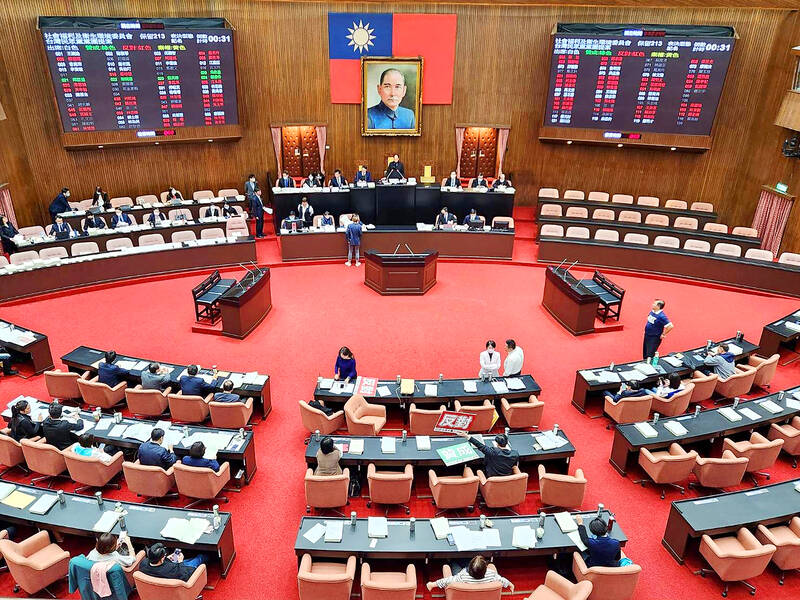The Chinese Nationalist Party (KMT) yesterday vowed to enhance the functions of the legislature by asking the president to give a “State of the Nation” address before lawmakers.
The party issued a statement ahead of the legislative speaker’s election on Feb. 1 after the Taiwan People’s Party (TPP) on Monday laid out its principles for choosing a legislative speaker.
In Saturday’s legislative elections, the DPP secured 51 seats in the 113-seat legislature, the KMT garnered 52 and the TPP won eight. Another two seats were won by independents aligned with the KMT.

Photo: Taipei Times
The KMT yesterday said its national policy priority for the incoming legislature would be based on a joint statement it made with the TPP on Oct. 30 last year, in which they agreed to cooperate.
“We will not deviate from the visions we presented in our meeting with the TPP last year. We will focus on exposing scandals in the DPP government’s procurement of COVID-19 vaccines produced by Medigen Vaccine Biologics Corp (高端疫苗) and reviewing bills to protect whistle-blowers. We will also follow the direction of public opinion, stand with the people and oversee the government,” the KMT said.
“We will follow our own path and invite those who share our political convictions to join us. This would prevent democratically elected leaders from governing the nation in a monolithic manner,” it added.
In the joint statement last year, the KMT and TPP pledged to jointly conduct a new wave of legislative reforms to avoid winner-takes-all democratic tyranny.
Among their agreements at the time the two parties had stated that the legislative functions under the framework laid down by the Constitution should be enhanced by asking the president to deliver a “State of the Nation” address before lawmakers.
The president should provide a supplementary report after hearing recommendations from different legislative caucuses, they said.
The appointment of the premier should be supported by the majority of lawmakers, and ministry officials should attend administrative hearings organized by lawmakers, they added.
Separately yesterday, Pan Men-an (潘孟安), the manager of Vice President William Lai’s (賴清德) election campaign, said that former presidents Chen Shui-bian (陳水扁) and Ma Ying-jeou (馬英九) were willing to give a “State of the Nation” address in the legislature, but neither was able to because party caucuses would have to negotiate over the details of such a request.
“Lai would not avoid such a request from the legislature,” Pan said.
Lai himself said during the presidential debate that the president is obligated to give a “State of the Nation” address and accept inquiries from lawmakers based on the Constitution and the Act Governing the Legislative Yuan’s Power (立法院職權行使法).
However, it is not the same as a question-and-answer session, he said.
Additional reporting by Chen Yun

The Ministry of the Interior (MOI) is to tighten rules for candidates running for public office, requiring them to declare that they do not hold a Chinese household registration or passport, and that they possess no other foreign citizenship. The requirement was set out in a draft amendment to the Enforcement Rules of the Public Officials Election and Recall Act (公職人員選舉罷免法 ) released by the ministry on Thursday. Under the proposal, candidates would need to make the declaration when submitting their registration forms, which would be published in the official election bulletin. The move follows the removal of several elected officials who were

The Republic of China (ROC) is celebrating its 114th Double Ten National Day today, featuring military parades and a variety of performances and speeches in front of the Presidential Office in Taipei. The Taiwan Taiko Association opened the celebrations with a 100-drummer performance, including young percussionists. As per tradition, an air force Mirage 2000 fighter jet flew over the Presidential Office as a part of the performance. The Honor Guards of the ROC and its marching band also heralded in a military parade. Students from Taichung's Shin Min High School then followed with a colorful performance using floral imagery to represent Taiwan's alternate name

COVETED PRIZE: The US president would be a peace prize laureate should he persuade Xi Jinping to abandon military aggression against Taiwan, William Lai said US President Donald Trump should get the Nobel Peace Prize should he be able to convince Chinese President Xi Jinping (習近平) to abandon the use of force against Taiwan, President William Lai (賴清德) told a conservative US radio show and podcast in an interview. The US is Taiwan’s most important international backer, despite the absence of formal ties, but since Trump took office earlier this year he has not announced any new arms sales to the nation. Trump could meet Xi at the APEC summit in South Korea on Oct. 31 and Nov. 1. Lai, speaking on The Clay Travis and Buck Sexton

A Chinese takeover of Taiwan would severely threaten the national security of the US, Japan, the Philippines and other nations, while global economic losses could reach US$10 trillion, National Security Council Deputy Secretary-General Lin Fei-fan (林飛帆) wrote in an article published yesterday in Foreign Affairs. “The future of Taiwan is not merely a regional concern; it is a test of whether the international order can withstand the pressure of authoritarian expansionism,” Lin wrote in the article titled “Taiwan’s Plan for Peace Through Strength — How Investments in Resilience Can Deter Beijing.” Chinese President Xi Jinping’s (習近平) intent to take Taiwan by force